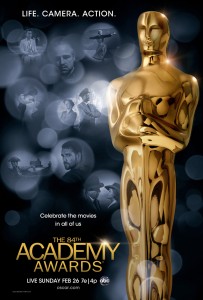By MCN Editor editor@moviecitynews.com
Academy “Celebrates the Movies” as Poster Art Kicks Off Oscar® Campaign
Academy “Celebrates the Movies” as Poster Art Kicks Off Oscar® Campaign
 Beverly Hills, CA – The Academy of Motion Picture Arts and Sciences has unveiled the poster for the 84th Academy Awards®. The art features the iconic Oscar statuette alongside memorable images from eight films spanning eight decades: “Gone with the Wind” (1939), “Casablanca” (1943), “Giant” (1956), “The Sound of Music” (1965), “The Godfather” (1972), “Driving Miss Daisy” (1989), “Forrest Gump” (1994) and “Gladiator” (2000). All the films featured on the poster won the Academy Award® for Best Picture, except “Giant,” for which George Stevens won the Oscar for Directing.
Beverly Hills, CA – The Academy of Motion Picture Arts and Sciences has unveiled the poster for the 84th Academy Awards®. The art features the iconic Oscar statuette alongside memorable images from eight films spanning eight decades: “Gone with the Wind” (1939), “Casablanca” (1943), “Giant” (1956), “The Sound of Music” (1965), “The Godfather” (1972), “Driving Miss Daisy” (1989), “Forrest Gump” (1994) and “Gladiator” (2000). All the films featured on the poster won the Academy Award® for Best Picture, except “Giant,” for which George Stevens won the Oscar for Directing.
Supported by the tagline “Celebrate the movies in all of us,” the design is meant to evoke the emotional connections we all have with the movies. “Whether it’s a first date or a holiday gathering with friends or family, movies are a big part of our memory,” said Academy President Tom Sherak. “The Academy Awards not only honor the excellence of these movies, but also celebrate what they mean to us as a culture and to each of us individually.”
The public is encouraged to download the poster image to use as wallpaper and profile icons, and to share with friends. The image is available on the Academy’s website, www.oscars.org/poster.
The artwork was created by award-winning graphic designer Anthony Goldschmidt, and Mark and Karen Crawford of the design firm Blood&Chocolate.
Posters will be available to theaters in the U.S. and internationally, along with a theatrical trailer, which will begin screening on January 6.
The 84th Academy Awards nominations will be announced live on Tuesday, January 24, 2012, at 5:30 a.m. PST in the Academy’s Samuel Goldwyn Theater.
Academy Awards for outstanding film achievements of 2011 will be presented on Sunday, February 26, 2012, at the Kodak Theatre at Hollywood & Highland Center®, and televised live at 7 p.m. EST/4 p.m. PST by the ABC Television Network. The Oscar presentation also will be televised live in more than 225 countries worldwide.













